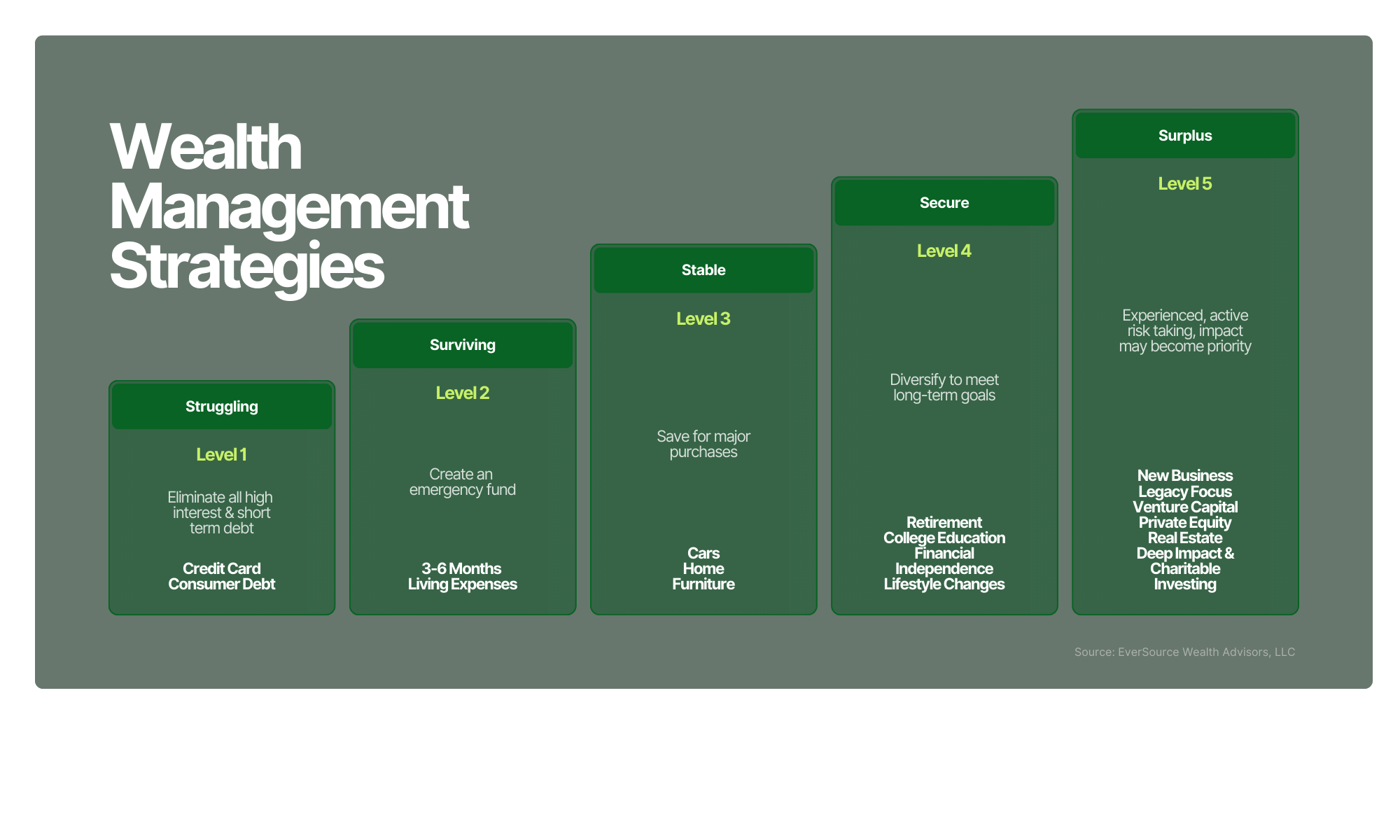A study done by New World Wealth (a nonpartisan wealth research firm) in 2015 found that 56.2 percent of the millionaires in the world were Christians and that they collectively manage over 55 percent of the world’s wealth. While this study is a bit dated, we might guess that the wealth allocation today is similar.
If all of Christian millionaires took Jesus’ exhortation from Luke 12:33-34 literally, sold their possessions, and gave to the needy (or, perhaps, started social enterprises in Africa), that could certainly make meaningful progress in eliminating human suffering such as food scarcity, insufficient access to healthcare and education, and so much more.
It’s tempting to think about wealth redistribution in this way as a simple, mathematical possibility. There, in fact, is a surplus among believers who have a generosity mandate from their King, and there is a deficit to be filled among the poor. This generosity mandate could, theoretically, serve to redistribute capital in such a way as to dramatically reduce the pain and suffering of a fallen world. Problem solved. Battle won. Right?
Except God doesn’t see it that way. If we believe that He is still in control and that He knows no scarcity, then math is not the problem and rules of thumb about giving are not relevant. God knows no lack that He should need our help achieving his financial goals. I imagine it would be easy for him to solve big problems like world hunger or sexual exploitation all by himself. Overnight even.
Rather, he invites us into our role as his stewards for the purpose of relationship (family) and to afford us the opportunity to store up treasure in heaven. He wants us to carry his heart for people, discern the kairos moments in our lives where he is moving, and learn his ways by taking on his yoke and walking closely with him. He delegates authority and stewardship responsibility to us to establish the values of heaven on the earth as we live in intimacy with him, expanding his family as we go.
As those who steward resources on his behalf, we need to embrace the reality that all of his goals are relational in nature. He is now, just as he always has been, pursuing the hearts of his sons and daughters and growing his family, filling the neighborhoods of heaven.
We are reminded in 1 Samuel 16:7, “...man looks at the outward appearance, but the Lord looks at the heart.” Said another way, man likes to do the math but the Lord weighs the heart of his steward.
The following are familiar passages, but let’s explore them in search of a more nuanced understanding of the heart of stewardship.
The Woman who Anointed Jesus
The sinful woman who anointed Jesus with costly perfume from an alabaster jar has had her story recorded in each of the four gospels. Each author mentions different details, but the one theme runs through three of the four counts: stewardship. The other guests at the banquet are appalled by the apparent wastefulness of her gesture.
Imagine the scene. This woman boldly barges into a room where she is not welcome, a room full of men who she knows will be judging her and hating her. She humiliates herself by causing a scene, openly weeping, lavishing her life savings, her tears, and her kisses on his dirty feet.
She reserves no wealth for herself, or even a shred of dignity. She knows she’s giving these men even more reasons to hate her, but she can’t be stopped. This is her one chance to beg for mercy and show Jesus who he is to her. Her only hope. Her King and Savior.
They are shocked and indignant. They question Jesus’ judgment that he would permit such a waste. They wonder why the valuable jar of ointment was not sold and the proceeds given to the poor. (They didn’t seem to be concerned about her financial well-being at all.)
A modernized translation of their complaint was essentially, “What were you thinking, Jesus? We could have used that money to purchase clean burning cookstoves or mosquito nets! What good does it do to let her pour it all over your feet?”
It looked to them as it might at first look to us, like a terrible stewardship decision. Jesus doesn’t see wastefulness.
He sees a stunningly executed, irrevocable display of love and worship. He redefines the priorities by telling them that the poor will always be there, and that this woman had anointed him in preparation for his burial. Her act was, in fact, a demonstration of excellent stewardship. While she didn’t consciously know about his upcoming crucifixion, she had prophetically discerned the importance and urgency of the moment, the one opportunity she had, and went all-in. She was in sync with divine timing.
God, give us eyes to see that the real treasure is you, and not money! You are the prize! God, give us hearts to discern the importance and urgency of the opportunities we have to pour out extravagant worship at the feet of Jesus. Give us the courage to go all-in and hold nothing back. Pursuing you wholeheartedly is Plan A and there is no Plan B.
This life is short, and while we want to care for the poor, we don’t want to settle for generic, mundane generosity that requires little – tithing our 10% and resting on our automatic monthly donations that we set and forget.
Give us energy and resolve to radically pursue encounters with Jesus and live in sync with the rhythms of heaven. We believe these encounters with you catalyze and focus our stewardship and give us the grace to live as willing, sold-out bondservants of Jesus Christ, and become the light to the world around us as he instructed us to do.
The Prodigal’s Father
The Father in Jesus’ parable of the Prodigal Son gives us a glimpse into God’s heart toward the wayward, but it also gives us valuable insight into Jesus’ perspective on stewardship. When the would-be prodigal asks his dad for his share of the family fortune, the father obliges and lets the boy walk off with half of his wealth. No questions asked.
The father and son lived together and we can presume the father knew his son well. He probably had a pretty good idea of what would be done with the wealth. Every involved parent knows the temptations and vulnerabilities of their children. Thus, it’s reasonable to conclude that the father was probably not shocked that the wealth was squandered on binge drinking and acquaintances of questionable character. He was probably not surprised by his son’s utter failure.
Why else would he be standing on the porch looking off into the distance, waiting for his son to return home? If the son was a tremendous success, he might have needed to stay in the new city to maintain businesses and properties established with the seed money from his dad. He might have started a family of his own.
It’s fascinating that the father didn’t seem to dissuade the son from the failure that he likely foresaw. Probably because this moment in their relationship didn’t happen in a vacuum. It was the crossroads at which they arrived after a culmination of many other events. The father had likely already given many years of loving and patient instruction to his son on how to approach life and stewardship. But those who don’t learn through instruction must go on to learn through experience and painful consequences.
Let’s put it into modern context and imagine that the father was a successful entrepreneur who had cultivated a $10 million net worth and had brought his two sons into the family business. He then allows the younger, less experienced son (who also happens to be the black sheep) to take off with $5 million…probably most of the liquid portion of the balance sheet.
This would seem to us to be not only unfair to the older son, but also unwise as the father himself is not dead yet and may yet incur substantial expenses in his retirement years. If there was a true excess of wealth, shouldn’t it have been given to the poor or brought to the temple?
In many ways, the actions of the father seem like a terrible waste of hard-earned resources.
Perhaps God holds a different perspective on these matters of stewardship and waste. He doesn’t seem to be as concerned about wasting money as we might be. Afterall, it’s only money.
The father seems to be far more concerned about his son than his money. His treasure seems to be his sons. When the prodigal returns, defeated and ashamed, the father rejoices and celebrates to the fullest extent, using even more resources to give the boy a warm welcome home party. How could he not celebrate extravagantly when the lost half of his fortune just walked back home to him?
God, give us eyes to see that the real value is found in people, and not money. Give us tenacious, love-inspired vigor to cherish and train up our children to know that they are world changers who can do far more to advance your kingdom than our donations or impact investments. Help us to ease up on our tendency to control, which comes from fear, and instead have faith that you can make all things work together for our good, and for theirs, and for the world around us.
Help us co-labor with your Spirit to cultivate in them a hunger to hear your voice and do impossible things with you, that they might pull down the culture and values of heaven into the earth. Help them to teach their children, in turn, to do the same, to a thousand generations.
The Barn Rebuilder
In the Parable of the Rich Fool in Luke 12, we see a man who experiences a windfall. He doesn’t know what to do with the surplus. Unfortunately, instead of asking God for direction, or seeking wise counsel from a trusted advisor, he inquires only of himself, saying “What shall I do, for I have nowhere to store my crops?”
All by himself, he hatches a plan to tear down the current barns and build larger ones that can hold more grain. When the job is done, he again counsels himself saying, “Soul, you have ample goods laid up for many years; relax, eat, drink, be merry.”’
In his independence, he falls into a trap. Since there is no one to help him see his blind spot, he unwittingly commits the worst act of wastefulness. We read God’s response in verse 20, “Fool! This night your soul is required of you, and the things you have prepared, whose will they be?”
He was so preoccupied with accumulating for himself that he missed the chance to perform acts of righteousness, generosity, and worship with his surplus. These would have been credited to his eternal net worth in heaven, at unimaginable rates of return that would have compounded forever! Oops! He missed out! Clearly, it would have been in his best interest to deploy a very different strategy.
Just a few verses later in the same chapter of Luke, Jesus exhorts his disciples to not be anxious about any of their material needs, not even basic ones like food and clothing. In stark contrast to the barn rebuilder, Jesus promotes a radically generous approach to stewardship. Zero wealth accumulation.
In verse 33 and 34, he says, “Sell your possessions, and give to the needy. Provide yourselves with moneybags that do not grow old, with a treasure in the heavens that does not fail, where no thief approaches and no moth destroys. For where your treasure is, there will your heart be also.”
As always, Jesus is concerned about the heart. Imagine him, with the same tender compassion in his eyes that he had as he talked with the Rich Young Ruler. In both instances, Jesus’ financial advice is to give it all away to the poor.
He doesn’t give this as a direct command that applies to everyone. (That is to say, it’s not a sin to accumulate like it is to murder or steal.) But Jesus seems to know something about the potentially harmful effect wealth accumulation has on the bearer.
Kingdom Stewardship versus Wealth Management
Our stewardship strategy, even in Christian wealth management, looks mostly the same as the conventional worldly approach. Basically, the goal is to work our way towards “Surplus” and reduce our dependence on God and other people. The steps generally play out sequentially as follows, unless we are born into a wealthy family or have a sudden wealth event.
We all start out Struggling, but with hard work we move to Surviving. Over time, the hard work and good habits that helped us escape the struggling phase lead us to become financially Stable. Eventually we achieve financial Security, if all goes according to plan and there aren’t any major setbacks. Those of us who are abundantly “blessed” achieve a state of Surplus (the phase we should desire for the sake of generosity).

Ironically, in Luke 6:20 Jesus says, “Blessed are you who are poor, for yours is the kingdom of God.”
The “king-dom” is the domain in which God is King, and occupies the throne of our hearts. The kingdom is, in fact, not so much a place, but a state of being in righteous relationship with God–acknowledging that He is Provider and Protector and the One who gives us our identity.
It is easier for the poor to embrace such a relationship with God because they don’t have other options. They cry out to God in their distress, and He answers them. They seek him and they find him because they must.
In the opposite way, then, it is difficult for the wealthy to enter the kingdom of God (as Jesus stated after his exchange with the Rich Young Ruler). This is because it’s hard to hold massive wealth without it taking the place of God in our hearts. It provides for us and protects us. It gives us an identity (“successful businessperson” or “one of the most important donors”).
Jesus also tells us that we “cannot serve both God and Mammon.” He knows that wealth puts demands on us. It demands our time, attention, and service. It makes us feel negligent and guilty if we don’t pay attention to it.
As a wealth advisor, I have seen this often in high-net-worth clients. Many of them grow tired of lengthy, complicated meetings with accountants, attorneys, and investment professionals. They long for simplicity.
At times they grow weary of the numerous decisions to be made. Where, when, and how much will they give or invest or pass along to their children. Some of them feel guilty about having their surplus and doubly guilty about not putting enough energy into learning how to steward it more wisely. Jesus knew that it is hard to possess a large surplus and not be possessed by it. But it’s not impossible.
For those who are called to steward a surplus, there is hope. We find it in Mark 10:24-25. Right after Jesus tells his disciples, “It is easier for a camel to go through the eye of a needle than for someone who is rich to enter the kingdom of God,” his followers are perplexed. But he ends his teaching with a powerful promise in Mark 10:26-27:
“The disciples were even more amazed, and said to each other, ‘Who then can be saved?’ Jesus looked at them and said, ‘With man this is impossible, but not with God; all things are possible with God.’”
God, give us eyes to see that the purpose of stewardship is never accumulation, or self-preservation. It is your job to take care of us and we trust you to do it faithfully.
Protect our hearts from the love of money and the deceitfulness of riches. They promise to provide for us, protect us, and give us significance, but it is a mirage. They must never replace you in the throne rooms of our hearts.
When we feel Mammon tightening its grip on our attention or our affection, when we feel its gravity pulling on our worship, help us to be wise and courageous. Help us to unclench our fists and give more of it away before we bow down to it, fully believing that it’s easy for you to entrust more resources to us when they are needed.
If you call us and give us the strength to steward a surplus, help us see that the purpose of that stewardship is not self-preservation, but family–your diverse, royal, priestly, ever-expanding family.
Help us to deeply receive and retain the revelation that stewardship is all about pursuing joyful, loving relationships with you and with our brothers and sisters for eternity. Your family is the treasure of heaven. Deposit your priorities into our hearts forever that we may keep them faithfully. Help us to always cherish what you cherish, and thus be transformed to become more like you.
Published on April 04 2024








